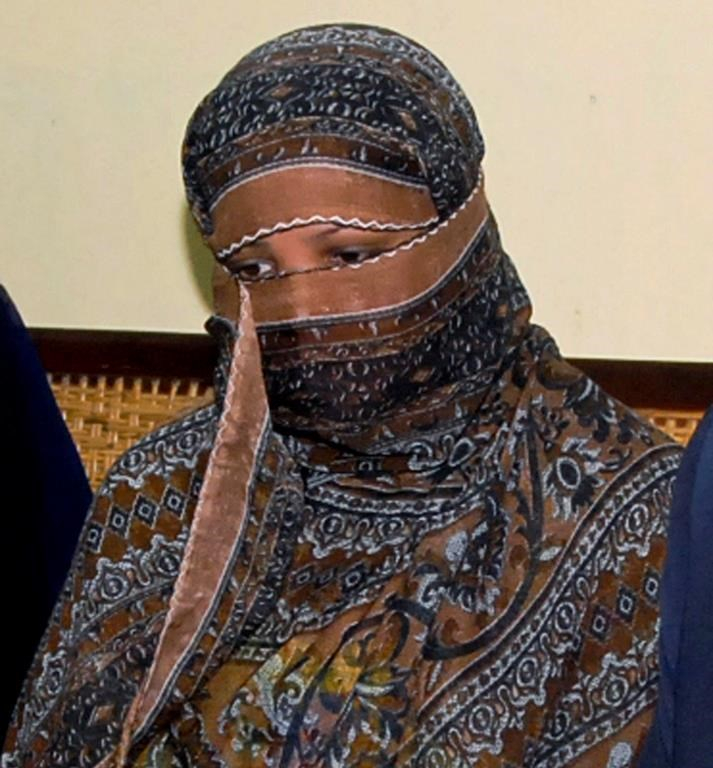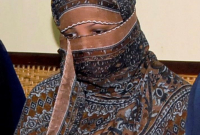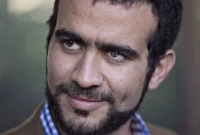Support strong Canadian climate journalism for 2025
A lawyer representing a Christian woman acquitted of blasphemy after she spent eight years on death row in Pakistan says she has arrived in Canada.
"She is finally free from all ordeals," Saif-ul Malook told The Canadian Press in an interview from Lahore, Pakistan.
Malook did not meet his client, Aasia Bibi, or talk to her before she left for Canada, but said she arrived Tuesday morning.
"Her daughters are in Ottawa. They landed in December last year so naturally she must have been joining them," he said.
Pakistani officials and others involved in the case said Wednesday that Bibi had left Pakistan to be reunited with her daughters in Canada, where they had been granted asylum.
Bibi was convicted of blasphemy in 2009 after a quarrel with a fellow farmworker. Pakistan's Supreme Court overturned her conviction last year and she had been in protective custody since then.
Malook said Bibi, who is in her mid-50s, was looking forward to coming to Canada.
"If you're in hell and somebody would say you're soon to be in paradise there is no question to ask," he said.
When Bibi was in prison, he said he'd sit with his client and spend "many, many hours and I'd tell her when you are released the American president will send his plane for you and she used to laugh."
Islamic extremists have rioted over the case and threatened to kill her. The same radical Islamists, many of whom have been jailed for their threats, also urged the overthrow of the government following Bibi's acquittal.
Malook said his safety is in jeopardy for helping Bibi, but there are people who need him.
He hopes she will be left alone in Canada.
"The Supreme Court of Pakistan has announced that the allegation against her for blasphemy was false," he said. "Please don't follow her. Let her lead the rest of her life in peace."
Wilson Chawdhry of the British Pakistani Christian Association told The Associated Press on Wednesday that he received a text message from a British diplomat saying "Aasia is out." A close friend of Bibi also confirmed that she had left the country, speaking on condition of anonymity for fear of reprisal.
A statement from the association says it received confirmation around 8 p.m. ET Tuesday that Bibi "had safely exited Pakistan."
"Asia Bibi bravely held on to her faith through the most brutal of incarcerations that involved her having access to sunlight for two hours per month," the statement says. "Now she finally travels to Canada to be reunited with her children."
Chowdhry said in the statement released by the association that Bibi is "unwell" after suffering a decade of isolation both in and out of captivity.
"She must be treated with utmost care and receive appropriate medical care now she is free," he said.
Officials at Pakistan's interior and foreign ministries also confirmed her departure, speaking on condition of anonymity because they were not authorized to brief media.
Prime Minister Justin Trudeau would not discuss the case Wednesday.
"I have no comment," Trudeau said. "Obviously, there are sensitive privacy issues and security issues on this and unfortunately I can't comment at this time."
Global Affairs Canada said Wednesday it "has no comment on this matter." Trudeau said last November that Canada was then in talks with the Pakistani government about Bibi.
The friend, who last spoke to her on Tuesday, said Bibi and her husband Ashiq Masih had spent the last several weeks getting their documents in order. He said she was longing to see her daughters, with whom she talked almost daily from her secure location, protected by Pakistani security forces.
Chawdhry said he had been in regular contact with Bibi's husband throughout the ordeal as well as with several diplomats involved in international efforts to get her to safety.
The case has brought international attention to Pakistan's controversial blasphemy law, which carries an automatic death penalty. The mere suspicion of blasphemy against Islam is enough to ignite mob lynchings in the country. The accusation of blasphemy has also been used to intimidate religious minorities and to settle scores.
Radical Islamists have made the punishment of blasphemy a major rallying cry, bringing tens of thousands into the streets and paralyzing major cities.
Salman Taseer, the governor of Punjab province, was shot and killed by one of his guards in 2011 for defending Bibi and criticizing the misuse of the blasphemy law. The assassin, Mumtaz Qadri, has been celebrated as a martyr by hardliners since he was hanged for the killing, with millions visiting a shrine set up for him near Islamabad. Pakistan's minister for minorities, Shahbaz Bhatti, was assassinated later that year after demanding justice for Bibi.
Prime Minister Imran Khan has vowed not to be intimidated by the rioters, saying the rule of law would decide Bibi's fate. But she was denied permission to leave the country for several months until sentiments cooled.
A three-judge Supreme Court panel in January cleared Bibi's final legal hurdle when they ruled there was no compelling reason to overturn the court's earlier acquittal. The judges accused those who charged Bibi with blasphemy of committing perjury, but said they would not be tried because of the sensitivity of the case. The judges upheld the blasphemy law.
— with files from Hina Alam in Vancouver and The Associated Press





Comments